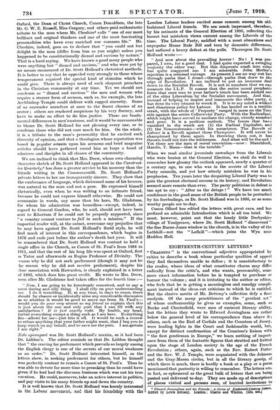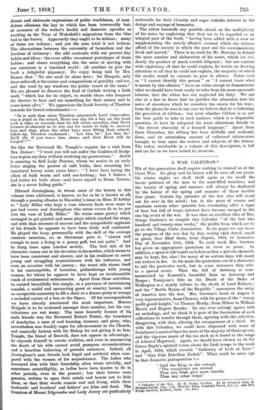EIGHTEENTH-CENTURY LEITERS.*
" Mumma " is the conventional adjective appropriated by critics to describe a book whose particular qualities of appeal they find themselves unable to define ; it is unsatisfactory to the reader, whose ideas of what constitutes charm may differ radically from the critic's, and who wants, presumably, some more exact information before he is tempted to purchase or borrow the volume ; and it is irritating to the author or editor, who feels that he is getting a meaningless and smudgy compli- ment instead of the clean-cut criticism to which he is entitled. But the elusive merits of Mr. Bettany's collection defy a finer analysis. Of the many practitioners of the "gentlest art" of whose craftsmanship he gives us examples, some, such as Burke and Chesterfield, were men of eminent literary ability, but the letters they wrote to Edward Jerningham are rather below the general level of his correspondence than above it ; others, such as the Earl of Carlisle and the Countess of Jersey, were leading lights in the Court and fashionable world, but, except for distinct confirmation of the Countess's liaison with " the first gentleman in Europe," we learn nothing of import- ance from them of the fantastic figures that strutted and fretted upon the stage of London society in the age of the French Revolution ; others, again, such as the Rev. Robert Potter and the Rev. W. J. Temple, were acquainted with the Johnson and the Gray-Mason circles, but in all the literary gossip, of which there is much, there is hardly a book or a play or a poem mentionedthat posterity is willing to remember. The letters are, in fact, as ephemeral as the great bulk of letters that are being posted and delivered to-day. They are made up of descriptions of places visited and persons seen, of hurried invitations to 2611Eerl7Y4 ba 'ante vtgriticirtli4g4 dinner and elaborate expressions of polite condolence, of scan- dalous allusions the key to which has been irrevocably lost, of accounts of the writer's health and domestic episodes as exciting as the Vicar of Wakefield's migrations from the blue bed to the brown. Apparently they ought to be tedious ; many of them are tedious ; and yet the sum total is not tedious. The alternations between the extremity of formalism and the freedom of intimacy : the odd contrasts with our present day habits and ideas: the even odder occasional prototypes of those habits : and above everything else the sense of moving with our ancestors in a vanished world : all combine to give the book a delightful piquancy. We enjoy being told by Mrs. Darner that " No one need be alone here : for Margate, only threemiles off, lathe centre and compendium of gentility and nos, and the road by ray windows the public resort of the same.!' We are pleased to discover the Earl of Carlisle writing a little work "which has for its object, to enable those who frequent the theatre to hear and see something for their money and to come home alive." We appreciate the frank ferocity of Thurlow towards his brutal schoolmaster :— "It is said that when Thurlow, afterwards Lord Chancellor. was a pupil at the school, Brett one day hit a boy on the head with a elate so severely that he fell down senseless, that Brett became so alarmed as to run out for water to help to recover him, and that, when the other boys were lifting their school. fellow up, Thus-low exclaimed : ' Let him be ! Let him lie ! He'll die if you leave him alone, and then Brett will be hanged !'"
We like the Reverend Mr. Temple's request for a visit from Mrs. Darner : "I trust you will not suffer the Goddess of Sculp- ture to pass mydoor without receiving my prostration." And it is amusing to find Lady Proctor, whom we notice in an early letter singing the praises of cold baths, thus recanting her unnatural heresy some years later : " I have been trying the effect of both warm and cold sea-bathing ; but I believe I had better let both alone—and leave myself to Dame Nature, she is a never failing guide."
Edward Jerningham, to whom most of the letters in this volume were addressed, is known, so far as he is known at all, through a passing allusion in Macaulay's essay on Mine. D'Arblay to "Lady Millar who kept a vase wherein fools were wont to put bad verses and Jerningham Who wrote verses fit to be put into the vase of Lady Millar." He wrote some poetry which managed to get printed and some plays which reached the stage, and with that measure of success and the sympathetic applause of his friends he appears to have been fairly well contented. He played the harp, presumably with the skill of the average amateur musician, or, as Stevenson puts it, " almost well enough to earn a living in a penny gaff, but not quite." And he hung loose upon London society. The best side of his character comes out in his devotion to his mother, which seems to have been consistent and sincere, and in his readiness to assist young and struggling acquaintances with his influence, and even on occasion with his money ; the worst side shows itself in his contemptible, if harmless, philanderings with young women, for whom he appears to have kept an inexhaustible stock of sentimental endearments. Apart from these activities, he existed beautifully but simply, as a purveyor of entertaining scandal, a useful and unexacting guest at country houses, and an acceptable nonentity to fill a chair at a dinner-party or occupy a secluded corner of a box at the Opera. Of his correspondents we have already mentioned the most important. Horace Walpole is to be reckoned amongst their number, but his con- tributions are not many. The most honestly human of his male friends was the Reverend Robert Potter, the translator of Aeschylus, a man of real learning, humour, and piety, who, nevertheless, was frankly eager for advancement in the Church, and comically furious with his Bishop for not giving it to him. Temple, the friend of Boswell, does not appear to advantage ; he expands himself in ornate civilities, and even in announcing the death of his wife cannot avoid pompous circumlocutions and a heartless balancing of periodic sentences. Indeed, all Jeniingham's men friends look frigid and artificial when com- pared with the women of his acquaintance. The ladies who honoured him with their friendship often wrote trivially, and sometimes unintelligibly, as ladies have been known to do in other periods, even in the present ; but their letters were genuine, written to open their minds and hearts not to hide them, so that their words remain real and living, while their husbands' and brothers' and fathers' are false and dead. The Countess of Mount Edgeurabe and Lady Jersey are particularly
noticeable for their vivacity and eager catholic interest in the doings and sayings of humanity.
The editor forestalls any possible attack on the multiplicity of his notes by explaining that they are to be regarded as an integral part of the book, " having been added with a view to supplementing the merely allusive account which the letters afford of the society in which the poet and his correspondents lived and moved." There is no need for Mr. Bettany to defend the mere number and elaboration of his notes, which are evi- dently the product of much careful diligence ; but not content with explaining all that he could explain, he insists on drawing attention to all that he could not explain, the majority of which the reader would be content to pass in silence. Notes such as " I cannot identify this person " or " I cannot trace what is meant by this allusion " have no value except to demonstrate what we should have been ready to infer from his more succesafu labours, that the editor has not neglected his duty. We are also at a loss to know how he justifies the admission into his notes of anecdotes which he considers too coarse for his text ; from the phrase he uses in one case we believe that he is following the precedent of Gibbon ; but even whether Gibbon is or not the best guide to take in such matters, which is a disputable question, at least he relegated his more obnoxious details to " the decent obscurity of a learned language." Apart from these blemishes, the editing has been skilfully and zealously done, and an astonishing amount of collateral information brought to bear upon the writers and subjects of the letters. The index, invaluable in a volume of this description, is full and (so far as we have tested it) accurate.



































 Previous page
Previous page